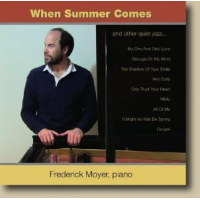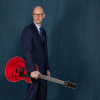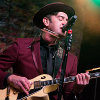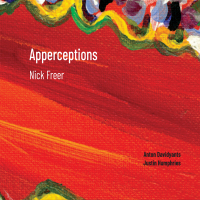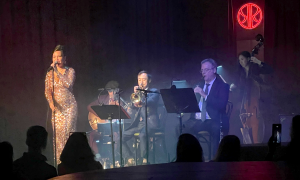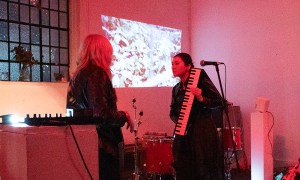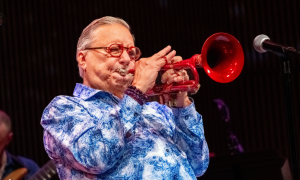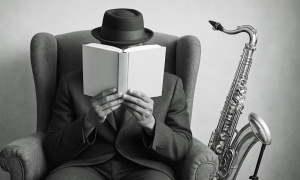Home » Jazz Articles » Live Review » 2013 Tri-C JazzFest: Cleveland, OH, April 19 - 27, 2013
2013 Tri-C JazzFest: Cleveland, OH, April 19 - 27, 2013

Cleveland, OH
April 19-April 27, 2013
There was a determined effort by Tri-C JazzFest Managing Director Terri Pontremoli to give this year's event more of a festival atmosphere than it has perhaps enjoyed in years past. For starters, many of the outlying venues, such as the East Cleveland library, a regular festival haunt, were scrapped in order to concentrate events downtown, with most concerts staged either in the grand theaters of Playhouse Square or on the Tri-C campus. Additionally, the first and second Saturday schedules (a third, one-show Saturday on May 4 was oddly set off from the rest of the festival by a week) were programmed to allow festival goers the opportunity to attend three shows in succession without leaving the confines of the Playhouse Square theater complex. Filler events—Q&As with artists, concerts by local bands —were also set up in a theater lobby to keep attendees engaged in between shows. These changes did add something of a new atmosphere, and certainly added convenience for those attending multiple shows, but it still seemed like people were coming out for individual shows and leaving. But maybe ticket sales will refute that observation.
Something that didn't change was the diversity of acts; the eclectic mix, as always, tried to cater to every niche of the jazz and jazz-like listening community of Greater Cleveland. Kicking off with a broadly appealing Friday night show by New Orleanians (and, apparently then, de facto jazzmen) singer Aaron Neville and pianist Dr. John, the festival went on to seek youth (pianist Robert Glasper), adult contemporaries (singers Natalie Cole and Michael Feinstein), traditionalists (saxophonists Kenny Garrett and Javon Jackson), smoothers (keyboardist Brian Simpson's Smooth Jazz All-Stars) and many others who represented varying degrees of musical experimentation (pianist Orrin Evans, clarinetist Anat Cohen and guitarists Bill Frisell and Lionel Loueke). And, of course, there was no skimping on homegrown flavors, with big shows by saxophonist Joe Lovano, whose set featured a cavalcade of local artists, trumpeter Dominick Farinacci, who introduced young phenom singer Cecile McLorin Salvant to the Cleveland market, and the festival's house band TCJF SoundWorks, which teamed with Jackson to pay tribute to the late saxophonist Dexter Gordon.
That first stacked Saturday kicked off with the Robert Glasper Experiment. Taking the stage after a short technical delay (the amiable Glasper seems always to face some kind of interference when performing in this town, be it from the sound system, the building, a clueless, noisy audience ...) with an altered lineup that retained only saxophonist/vocoderist Casey Benjamin from the Grammy Award-winning Black Radio (Blue Note, 2012), Glasper's group chugged out sounds at once futuristic and nostalgic. Without the aid of the R&B vocal talent that graces the record, singing duties fell to Benjamin, whose vocoder rendered quickly passing lyrics unintelligible, but gave a nice, outer-spaceway warble to refrains.

With the altered words reverberating over the steady, funky beat laid down by drummer Mark Colenburg and bassist Burniss Travis, and Glasper's rising and falling electric sprinkles, an undulating pulse was broadcast to the room, lifting some from their seats to flex in commiserate boogie. But after a few numbers, and despite some interesting interludes from Glasper and Benjamin's occasional shift to saxophone, a sameness took over the music: there was little difference between the vocodered beats carrying "The Consequences of Jealousy" and "Smells Like Teen Spirit." Still, the early Saturday afternoon crowd seemed to dig it and confirmed its affirmation by gamely, if falteringly, singing along during the encore—a cover of Floetry's "Say Yes."
There was a more partisan reaction to Orrin Evans' set a few nights later, unless the front exits of the Tri-C Auditorium simply revealed departures more readily than the Ohio Theatre that hosted Glasper. The audience sent vocal affirmations reporting through the air, with the spent powder settling on the heads of those filing out after each number. Strange. Not, surely, a straight-ahead player, Evans also is no wild experimenter. So the love-it/hate-it response he garnered on this night was odd—and unfortunate, since this trio's performance was the most engrossing of the festival.
Sticking largely to tunes from 2012's Flip the Script (Posi-Tone), Evans and his mates—drummer Donald Edwards and bassist Ben Wolfe—unleashed strong, exploratory music. And maybe the thundering drum assaults, blown into and left to expire in open spaces, or the light pianistic musings that changed course—after Evan leaned back on his bench to consider—to storm down a new path with a new plea, unnerved some. Their loss.

Through "Appointment in Milano," "Big Small" (a standout that opened on Wolfe's deep, thick tone, moved into piano-drum fury then to more avant terrors before finishing on single notes poked from the piano with an index finger), the anxiously melancholic "The Answer," the cinematic "When" (fed by Edwards' mallets and twisting its way through an emphatic, but never-inevitable course), and "Blessed One the Eternal Truth"—a praise song lifted, through Evans' voice, in a manner that recalled Al Hibbler if a good deal less steady and attached to key, crooned over sparse piano and brushed drums with genuine feeling—the set was one of constant musical renewal.
While exploratory, Anat Cohen's set two nights later—played in the same Tri-C Auditorium along with Israel's Rimon School Jazz Ensemble, which featured the accomplished novelty of Tali Rubinstein on recorder and the fine, rhythmic complexity of Yogev Gabay on drums—wasn't nearly as tight. But Cohen snaked admirably through the thumping mix of funk, blues and Israeli folk music—an invigorating set of music composed, save for the closer, "Hello Dolly," entirely by the students.
Conversely, Frisell's Beautiful Dreamers set, on the second Saturday, April 27, weaved a mood-drenched tapestry, strung from American musical thread. Along with violist Eyvind Kang and drummer Rudy Royston, the guitarist fashioned a haunting stream that fed through "Hard Times," "Lush Life," "Misterioso" and "Nobody's Fault but Mine," the final number featuring a viola that morphed into mandolin and blues guitar under Kang's expert fingers. The group then shifted to a three-song tribute to drummer Paul Motian: "Dance," "Abacus," and "It Should've Happened a Long Time Ago," the latter bringing Joe Lovano out from the wings in an unexpected reunion (to Frisell's telling) of Motian's one-time saxophonist and guitarist.
Lovano stuck around for a go at "Hot House" (a tune the saxophonist would call again a few hours later in his own set), and then departed as the trio closed with "Old Man River," a sense of the tragic and the spooky caught up in Frisell's melodic loops, and the tune automatically causing clips from the movie, The Great Flood (to which Frisell supplied the soundtrack), to replay through the heads of any audience member lucky enough to have caught the flick a few weeks earlier at the Cleveland International Film Festival.

Loueke's show, one of two festival concerts staged east of downtown—this, at the Museum of Contemporary Art's new uptown digs; the other the Gordon tribute held at Nighttown in Cleveland Heights—brought surprise after surprise. Playing only material from his latest release, Heritage (Blue Note, 2012), but in trio with bassist Michael Olatuja and drummer John Davis, and thus working without the keyboard services of album co- producer Glasper, Loueke was free to fill a lot more space with his diverse guitar talents.
Over driving, rock-steady beats, Loueke employed blistering finger work and well-placed pedal effects to push the blues into the 22nd century, accelerating his lines at one point from loose, John Lee Hooker-like accompaniment to the high-pitched whirl of tape playing in fast-forward. There was a single, vibrating note, as if spun from a finger tracing the rim of a glass, and, elsewhere, electronic scramble and crackling alarm dissonance. All this mixed in easy communion with sweet, jumping African melodies. On "Ifê," Loueke applied an echo effect to his singing, giving it the force of choir.
Kenny Garrett's quintet turned in a powerfully memorable set, taking the Ohio Theatre stage after Glasper on the first Saturday. Playing five numbers from Seeds From the Underground (Mack Avenue, 2012) plus the crowd-pleasing closer, "Happy People," the saxophonist adopted the tone and posture of one conducting a ceremony (or revival, perhaps), as he paid tribute to his forbearers and his native Detroit. Whether on alto or soprano sax, his playing seemed a natural vocal extension of himself, and his band supplied the requisite tumult or swing. On a few occasions, Garrett motioned to the crowd to continue its applause as he kept the music going, but, otherwise, the performance came without artifice.
Javon Jackson, who played the following night at the Cleveland Heights jazz club, Nighttown, was likewise sincere in his playing, but offered few surprises in two straight-ahead sets with TCJF SoundWorks that featured tunes composed or associated with Dexter Gordon. Pianist Chip Stephens was, perhaps, the most intriguing player of the evening, moving from bouncing Art Tatum-isms to crashing, angular approaches as the tune dictated. Saxophonist Howie Smith cut distinctive, howling, laughing lines on the opening numbers of each set (before Jackson came on), offering up the most notable composition/arrangement of the night with a piece he called "It's Happening Again" (culled from the same changes as Gordon's "Fried Bananas," which itself borrowed from "It Could Happen To You"), a duet that pitted Smith's alto lines in harmonic counterpoint—and then as melodic paths twisting—with lines from trombonist Chris Anderson.

The festival always places a strong emphasis on local talent and on bringing back native Clevelanders who have made a strong national and international impact. Lovano, one of the greatest jazzers ever to come out of Cleveland, regularly fills a festival slot, as does Farinacci, a graduate of the Tri-C jazz program. Both used their stage time this year to highlight others. In a show billed as a celebration of his 60th birthday (which actually rolled around last December), Lovano appropriately made the event a family and friends affair, much as he did in an appearance on the eve of his 58th birthday at Nighttown.
Opening with his Us Five group (with Cleveland drummer Jamey Haddad sitting in for Francisco Mela), the saxophonist ran through a couple tunes from Cross Culture (Blue Note, 2013) and Folk Art (Blue Note, 2009) before inviting his wife, singer Judi Silvano, onstage to lend piercing, nonverbal vocals to Lovano originals, "Sanctuary Park" and "Golden Horn."
From here on out the cast of characters was in constant flux. Lovano conducted a few tenor battles with Ernie Krivda; ran throughthe "Northeast Ohio Suite" with his brother, drummer Anthony Lovano and bassist Jeff Anastesia; teamed up with old classmates, drummer Carmen Castaldi and bassist Ron Smith, for a tribute to late Cleveland saxophonist Albert Ayler; and went full bore on Oscar Pettiford's "Blues in the Closet," with a host of long-time Cleveland players: organist Eddie Baccus Sr., drummer Greg Bandy, trumpeters Kenny Davis and Carl Lovano (Joe's uncle), vibraphonist Ron Busch and Krivda. Multiplayer reviews like this rarely maintain cohesiveness or sustain a mood, and this one was no exception. But it was good fun, and Lovano showed off his enviable range on tenor, G mezzo soprano and double-soprano autochrome to the delight of the hometown crowd.

Farinacci likewise charmed the natives. Mixing strong, well-articulated trumpet and flugelhorn lines with a well-oiled hometown standup routine (his 80-something "Nana" never escapes a callout and good-natured ribbing), the latter-day Rat Packer with a horn displayed not only supreme ease and confidence onstage, but took complete ownership of the situation—a leader in the fullest sense. And while there was plenty of space for his own soloing, that featured maturely drawn musical arcs, he gave a lot of time over to others, as well—most notably pianist Aaron Diehl, who just released his Mack Avenue debut The Bespoke Man's Narrative (2013), and singer Cecile McLorin Salvant, whose own debut on the Detroit label, Woman Child (2013), is due out later this month.
Farinacci, of course, is aware of the buzz McLorin Salvant has generated, and he featured her on half the tunes of his eight-song set. (She also figured in the final number, a jam session of sorts with local high-school students, guitarist Lucas Kadish and bassist Jamal Collins.) As it turns out, the buzz was perhaps too subdued. Salvant exercised a flamboyant actor's sensibility, her face morphing through a host of expressions as her voice effortlessly recalled the history of jazz singing. Sarah Vaughan, Ella Fitzgerald, Betty Carter, Abbey Lincoln often flipped by in the course of a single song—or even a single line. Which isn't to say Salvant was simply aping her predecessors, but that she displayed such broad familiarity with —and full command of—jazz singing that she was able to work a lyric anyway she saw fit and, just as importantly, was not only unafraid, but relished doing so, as with the insightfully comic yawn over the final word of the "Mean To Me" line "you love to see me crying." If anything, she may need to relax the throttle on her inventiveness—it can, at times, be too much to follow and digest. But wow; thrilling, nonetheless.
Natalie Cole, on the festival's final night, stuck more to the scripted melodies. Gamely battling a cold (or allergies, perhaps) the singer didn't scrimp on delivering fan favorites over the course of 90-plus minutes of music (on top of an hour set from the Clayton-Hamilton Jazz Orchestra). While some of the numbers had the feel of obligation (two songs in duet with recordings of her father, Nat King Cole—"Unforgettable" and "Acércate más"—and her hit, "Miss You Like Crazy"), others, like renditions of Charlie Chaplin's "Smile" and Etta James' trademark "At Last," were inspired. And with its high style, big band backing—and, yes, manufactured string section—the show provided a grand close to the JazzFest that is, perhaps, more festival than ever.
Photo Credit
All Photos: Matt Marshall
Tags
Live Reviews
Matt Marshall
United States
Ohio
Cleveland
Tri-C JazzFest Cleveland
Aaron Neville
Dr. John
Robert Glasper
Natalie Cole
Michael Feinstein
Kenny Garrett
Javon Jackson
Brian Simpson
Orrin Evans
Anat Cohen
Bill Frisell
Lionel Loueke
joe lovano
Dominick Farinacci
Cecile McLorin Salvant
Dexter Gordon
Casey Benjamin
Mark Colenburg
Burniss Travis
Donald Edwards
Ben Wolfe
Al Hibbler
Eyvind Kang
Rudy Royston
Paul Motian
Michael Olatuja
John Davis
John Lee Hooker
Chip Stephens
Art Tatum
Howie Smith
Chris Anderson
Jamey Haddad
Francisco Mela
Judi Silvano
Ernie Krivda
Albert Ayler
Oscar Pettiford
Eddie Baccus Sr.
Greg Bandy
Kenny Davis
Aaron Diehl
Sarah Vaughan
Ella Fitzgerald
Betty Carter
Abbey Lincoln
Clayton-Hamilton Jazz Orchestra
Nat
Etta James
PREVIOUS / NEXT
Support All About Jazz
 All About Jazz has been a pillar of jazz since 1995, championing it as an art form and, more importantly, supporting the musicians who make it. Our enduring commitment has made "AAJ" one of the most culturally important websites of its kind, read by hundreds of thousands of fans, musicians and industry figures every month.
All About Jazz has been a pillar of jazz since 1995, championing it as an art form and, more importantly, supporting the musicians who make it. Our enduring commitment has made "AAJ" one of the most culturally important websites of its kind, read by hundreds of thousands of fans, musicians and industry figures every month.
Go Ad Free!
To maintain our platform while developing new means to foster jazz discovery and connectivity, we need your help. You can become a sustaining member for as little as $20 and in return, we'll immediately hide those pesky ads plus provide access to future articles for a full year. This winning combination vastly improves your AAJ experience and allow us to vigorously build on the pioneering work we first started in 1995. So enjoy an ad-free AAJ experience and help us remain a positive beacon for jazz by making a donation today.Near
Cleveland Concerts
Jan
4
Sun


